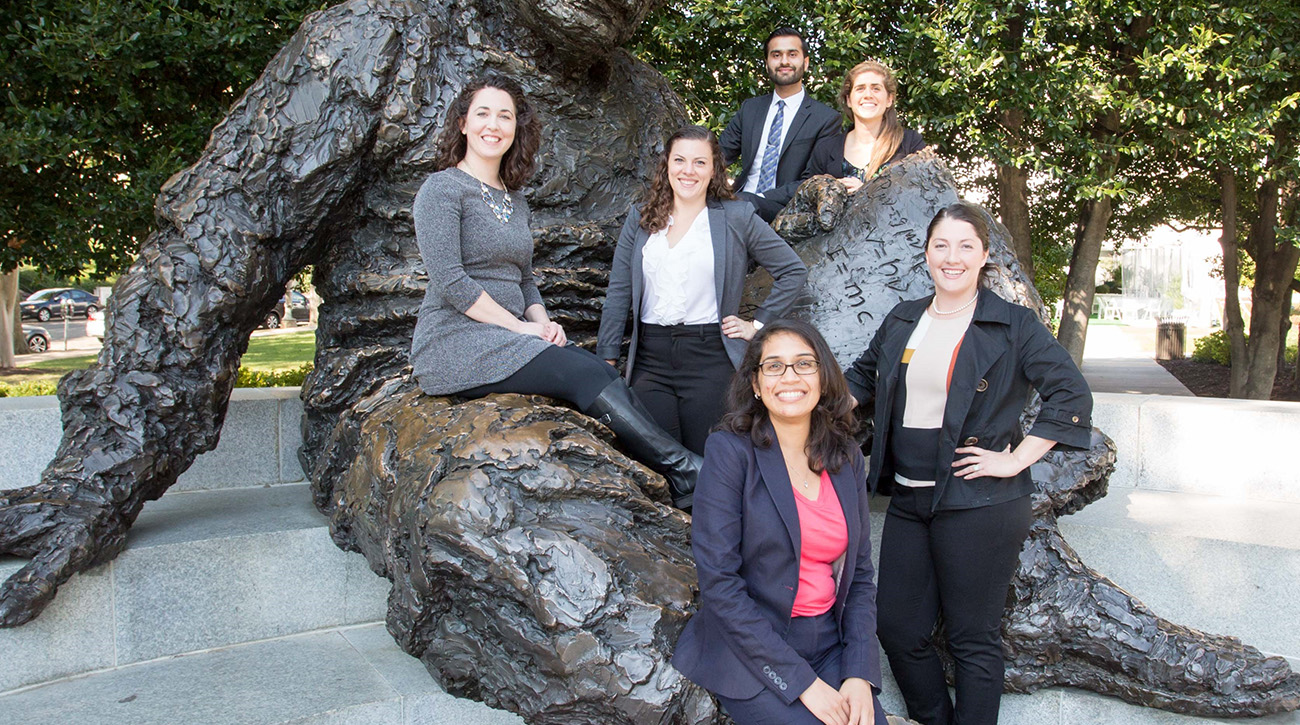George Washington University students were awarded the grand prize at the fourth annual DC Public Health Case Challenge held in October 2016 at the National Academy of Medicine (NAM) annual meeting. Each year, students from area universities in a variety of disciplines at the undergraduate and graduate level compete to develop a comprehensive intervention aimed at solving a local public health problem in only two weeks. This year’s challenge, “The Changing American City and Implications for Health and Well-being of Vulnerable Populations,” was focused on gentrification in DC. Students from Milken Institute School of Public Health, the Graduate School of Education and Human Development, and the School of Medicine and Health Sciences developed the winning plan.
Cities around the US, particularly DC, are seeing rapid growth and a changing urban landscape. But there are challenges and controversies with this growth, because it often displaces the lower-income families and businesses who have called those neighborhoods home.
“NAM encouraged students who will be future public health leaders to have a systematic thinking and come up with bold and brazen, yet realistic and practical solutions to the root cause of gentrification instead of treating the symptoms and accepting the status quo,” said public health student Ans Irfan. “It is critical to address gentrification to save the diverse and historic culture of the Nation’s Capital and create practical solutions that encourage development and investment without disintegrating the social fabric of America.”
To do this, the team’s proposal, “Communities for Collective Action,” took a three-prong approach to address both immediate and long-term issues associated with gentrification. First, they recommended the development of an app to create a digital community where residents who were either displaced or at risk for displacement could find resources from healthcare to housing to legal aid and transportation. Second, create a community training program to teach residents to advocate for themselves. Third, form a learning collaborative to bring together community organizations which share similar missions to amplify their efforts. “We also recognized that robust social support is very important in changing communities, so each aspect of our proposal sought to bring people together to create more social cohesion," said public health student Amelia Whitman.
“What made the case competition such a valuable experience was that it encouraged interdisciplinary collaboration,” said public health student Jenny Reiner. She said her teammates from three GW schools offered unique perspectives. “We each brought different skills and experiences to help analyze the issue and brainstorm solutions.”

Advisors Dr. Angie Hinzey, director of ISCOPES, and Dr. Elizabeth Tuckwiller from GSEHD say they value the practical and interprofessional experience the competition affords GW students. “Collaborating to address complex issues—like gentrification—is powerful and transformative,” they say. “We are so proud of them, not only for the winning, theory-based, evidence-supported, interdisciplinary solution they generated that could make a difference in DC and other metropolitan areas, but for how they honored the voice of the communities that it was designed to serve.”
Students on the team included Mary Y. Bonnell, EdD in Special Education and Disability Studies candidate, Ans Irfan, MPH in Environmental Health Science and Policy candidate, Jenny Reiner, MPH in Health Promotion candidate, Puja Sheth, MD candidate, Taylor Tresatti, MPH in Global Health Program Design, Monitoring and Evaluation candidate, and Amelia Whitman, MPH in Health Policy candidate.


